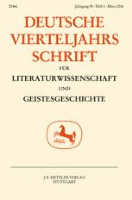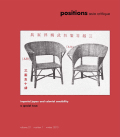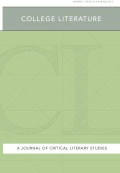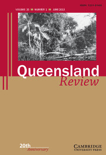
Colloquia Humanistica
Scope & Guideline
Fostering Global Dialogue in the Arts and Humanities
Introduction
Aims and Scopes
- Cultural Identity and Memory Studies:
The journal focuses on the exploration of cultural identities, particularly in the context of historical events and collective memories. This includes examining how cultural narratives shape identities in post-socialist societies and their implications for contemporary discourse. - Interdisciplinary Historical Analysis:
Colloquia Humanistica employs interdisciplinary methodologies to analyze historical phenomena, offering insights into the socio-political impacts of history on various communities. This includes studies on significant historical figures and events across different cultural landscapes. - Literary and Artistic Critique:
The journal emphasizes literary and artistic contributions that reflect cultural tensions and transformations. It provides a platform for examining how literature and art engage with themes of identity, conflict, and societal change. - Focus on Peripheral Histories:
A unique contribution of the journal is its focus on peripheral histories, analyzing perspectives and narratives from marginalized or lesser-studied regions. This includes examining the historical significance of regions like the Balkans and their cultural outputs. - Transcultural Engagements:
The journal explores transcultural interactions and their impact on identity formation, particularly in the context of migration and globalization. This includes analyzing how cultural exchanges shape societal norms and artistic expressions.
Trending and Emerging
- Cultural Policy and National Identity:
There is an increasing focus on cultural policies and their role in shaping national identities, particularly in post-Soviet and Eastern European contexts. This trend reflects a growing interest in how cultural governance influences societal cohesion and identity formation. - Holocaust Oral History and Collective Memory:
Recent studies on Holocaust oral histories are gaining prominence, emphasizing the importance of personal narratives in understanding collective memory. This theme resonates with contemporary discussions about memory politics and historical accountability. - Transnational Perspectives on History:
Emerging themes include transnational studies that explore historical narratives across borders. This reflects a shift towards understanding how interconnected histories influence current cultural and political dynamics, particularly in Europe. - Environmental Humanities:
There is a notable rise in publications addressing environmental issues through the lens of the humanities. This trend highlights the intersection of culture, society, and environmental challenges, emphasizing the role of the humanities in addressing contemporary crises. - Digital Humanities and Folklore Studies:
The integration of digital humanities methodologies into folklore studies is becoming increasingly relevant. This reflects a trend towards utilizing technology to analyze and disseminate cultural narratives, particularly in the context of modern communication.
Declining or Waning
- Post-Socialist Urban Studies:
Although initially a significant focus, studies specifically centered on post-socialist urbanism have become less frequent. This decline may be attributed to a shift towards broader cultural analyses rather than localized urban studies. - Holocaust Education and Memory:
The specific focus on Holocaust education and its implications in various national contexts appears to be diminishing. While still relevant, the frequency of publications addressing this theme has decreased, possibly due to the emergence of other pressing cultural issues. - Bilingualism and Multiculturalism Studies:
Research centered on bilingualism and multiculturalism in the Balkans has seen a reduction in publication frequency. This may reflect a broader trend towards examining cultural identity through more complex lenses rather than solely language perspectives. - Theoretical Approaches to Historical Narratives:
The journal's engagement with purely theoretical frameworks for understanding historical narratives has waned. There is a noticeable shift towards empirical case studies that provide concrete examples of cultural and historical dynamics.
Similar Journals

DEUTSCHE VIERTELJAHRSSCHRIFT FUR LITERATURWISSENSCHAFT UND GEISTESGESCHICHTE
Fostering Insights into the Dynamics of Thought and Culture.DEUTSCHE VIERTELJAHRSSCHRIFT FUR LITERATURWISSENSCHAFT UND GEISTESGESCHICHTE, published by J B METZLER, is a distinguished academic journal hailing from Germany that offers a profound exploration of literature, cultural studies, and philosophy. With its ISSN 0012-0936 and E-ISSN 2365-9521, this journal has been operational since its inception in 1973, continually contributing to the intellectual discourse surrounding literary and philosophical theories. The journal holds a recognized position within the academic landscape, achieving a Q3 ranking in Literature and Literary Theory and Q4 in both Cultural Studies and Philosophy as of 2023. Although it does not currently offer Open Access options, its impact in the field is underscored by its ranking in Scopus, where it is recognized amongst a competitive cohort of journals. Aimed at researchers, professionals, and students alike, the DEUTSCHE VIERTELJAHRSSCHRIFT serves as an invaluable resource for those investigating the intersections of literature and the broader cultural milieu, fostering an understanding of the dynamics that shape literary and philosophical thought.

POETICA-ZEITSCHRIFT FUR SPRACH-UND LITERATURWISSENSCHAFT
Exploring the Depths of Language and LiteraturePOETICA-ZEITSCHRIFT FUR SPRACH-UND LITERATURWISSENSCHAFT is a pivotal journal published by Brill, focusing on the fields of linguistics and literary studies. Founded in Germany, this esteemed publication showcases rigorous scholarly research, fostering a deeper understanding of language and literature. Although the journal does not currently operate as an open-access platform, it remains an essential resource for academics in these areas, featuring innovative studies that span from 2002, through selected years, to 2024. With a Q4 category in Linguistics and Language and a Q3 in Literature and Literary Theory as of 2023, POETICA ranks among the significant contributors to the arts and humanities discourse. It provides a vital forum for researchers and students to engage with contemporary debates and methodologies, ensuring its relevance and importance in the academic community.

Miscelanea de Estudios Arabes y Hebraicos-Seccion Arabe-Islam
Elevating Research in Arabic and Hebrew InteractionsMiscelanea de Estudios Arabes y Hebraicos-Seccion Arabe-Islam is a distinguished academic journal dedicated to the study of Arabic and Islamic studies, published by UNIV GRANADA, EDITORIAL. With an ISSN of 1696-5868 and E-ISSN 2341-0906, this publication provides a vital platform for scholars and researchers interested in the deep historical, cultural, and linguistic connections between the Arab and Hebrew worlds. Situated in the heart of Granada, Spain, this journal aims to promote interdisciplinary approaches and foster dialogue among academics in these rich fields of study. Although it operates under traditional access protocols, the journal’s commitment to quality is reflected in its rigorous peer-review process, making it a valuable resource for researchers, professionals, and students alike. By engaging with cutting-edge research and critical perspectives, the journal plays an essential role in enhancing the understanding of Arabic and Islamic heritage today.

ENGLISH LANGUAGE NOTES
Cultivating a Rich Dialogue in Literary TheoryENGLISH LANGUAGE NOTES is a premier journal published by the University of Colorado, dedicated to the field of literature and literary theory. With a strong impact in academia, it holds a prestigious Q2 ranking in the 2023 category, emphasizing its importance among scholarly publications. The journal, indexed under ISSN 0013-8282 and E-ISSN 2573-3575, has been a crucial resource since its inception in 1969, featuring converged years from 1969, 1977, and 1982, through to 2024. The editorial board promotes rigorous scholarship and encourages contributions that explore the complexities of the English language across diverse literary contexts. While it does not offer open access, ENGLISH LANGUAGE NOTES remains a vital source for researchers, professionals, and students invested in the sustained exploration of literary arts, evidenced by its strong Scopus ranking in the 79th percentile in its field. For those committed to advancing literary scholarship, this journal serves as an invaluable platform for discussion and dissemination of influential ideas.

Positions-Asia Critique
Exploring the Cultural Tapestry of Asia's Past and PresentPositions-Asia Critique, published by DUKE UNIV PRESS, is a leading academic journal dedicated to exploring the intersections of cultural studies, literature, and the visual arts within Asian contexts. With an ISSN of 1067-9847 and an E-ISSN of 1527-8271, this journal has established itself as an influential platform for rigorous scholarship since its inception in 2001. It encompasses a diverse range of interdisciplinary research, addressing contemporary issues while reflecting on historical narratives, thereby contributing significantly to the fields of Cultural Studies, History, Literature and Literary Theory, and Visual Arts and Performing Arts. Notably, in 2023, it achieved Q2 rankings in Cultural Studies and History, and Q1 rankings in both Literature and Literary Theory, as well as Visual Arts and Performing Arts, positioning it within the top tiers of academic discourse. Although not an open access journal, Positions-Asia Critique provides extensive access options through institutional subscriptions, ensuring researchers, professionals, and students can engage with its innovative perspectives. As it converges towards its milestone of 2024, the journal will continue to be at the forefront of critical dialogues surrounding Asia's complex cultural landscapes.

GOYA
Connecting Creativity with Critical ThoughtGOYA, published by the esteemed FUNDACION LAZARO GALDIANO, is a pivotal journal in the field of Visual Arts and Performing Arts. With an ISSN of 0017-2715, this Spanish journal serves as a critical platform for scholars, artists, and practitioners to engage with contemporary issues, trends, and methodologies in the arts. Since its inception, GOYA has strived to illuminate the intersection of artistic expression and cultural discourse, with coverage spanning from 2002 to 2024. The journal proudly holds a Q3 category ranking in the 2023 Scopus assessments for its field, reflecting its respected position among peers, with a notable rank of #377 out of 667. Though it does not follow an Open Access model, GOYA continues to contribute significantly to the academic landscape, enabling a deeper understanding of artistic practices and their societal implications. Researchers and students alike will find the journal an invaluable resource for insights and inspiration within the dynamic realm of the arts.

YALE FRENCH STUDIES
Unveiling the Rich Tapestry of Francophone HeritageYale French Studies is a prominent academic journal published by Yale University Press in the United States, dedicated to advancing the discourse on Francophone literature, culture, and thought. With an ISSN of 0044-0078, this journal serves as a vital platform for interdisciplinary scholarship, encompassing areas such as cultural studies, history, and sociology. Although it operates under a traditional subscription model, its contributions are significant, particularly between the converged years spanning 2002 to 2014, 2018 to 2019, and 2021 to 2023. The journal currently holds Q4 rankings in various categories, including cultural studies and visual arts, and offers rich, scholarly insights that are crucial for researchers, professionals, and students alike. As an esteemed publication in the realm of literature and literary theory, Yale French Studies is instrumental in fostering a deeper understanding of French cultural contexts and their global implications, marking it as an essential resource for anyone engaged in Francophone studies.

COLLEGE LITERATURE
Fostering Insightful Literary ScholarshipCOLLEGE LITERATURE, published by the Johns Hopkins University Press, is a renowned journal dedicated to advancing the field of literary studies and education. With its ISSN 0093-3139 and E-ISSN 1542-4286, the journal spans a historic timeline from 2002 to 2024, highlighting its ongoing commitment to scholarly discourse. Although it operates under a traditional publishing model without open access provisions, it maintains a significant presence within academia, placing in Q3 in Literature and Literary Theory and Q4 in Education as of 2023. The journal ranks #277 out of 1106 in its category, reflecting its reputable standing in the 74th percentile within the Scopus database. With a strong focus on critical literary analysis and educational methodologies, COLLEGE LITERATURE serves as a vital resource for researchers, educators, and students seeking to deepen their understanding of literature's role in society. Its comprehensive approach ensures a broad spectrum of perspectives and insights, fostering a rich academic environment that engages and challenges its readership.

Queensland Review
Unveiling the Stories Behind Australia's Cultural Landscape.Queensland Review is a distinguished academic journal published by EQUINOX PUBLISHING LTD, focusing on the fields of Cultural Studies, History, Literature, and Sociology. Since its inception, the journal has played a pivotal role in fostering scholarly discourse and disseminating research that explores the cultural and historical narratives of Australia and beyond. As evidenced by its classifications in the 2023 category quartiles, Queensland Review holds notable positions in Q3 for both History and Literature, alongside a Q4 ranking in Cultural Studies and Sociology and Political Science, indicating its growing influence in these fields. While the journal currently does not offer Open Access, it remains a vital resource for researchers and practitioners seeking to deepen their understanding of cultural dynamics and historical contexts. The journal's contribution to academic literature is further underscored by its respectable rankings in Scopus, where it ranks in the 60th percentile for Literature and Literary Theory. Positioned in the United Kingdom, Queensland Review continues to attract a diverse array of submissions, making it an essential publication for scholars engaged in the ever-evolving study of cultural and literary phenomena.

Iberoamericana
Connecting Cultures: A Platform for Scholarly ExchangeIberoamericana, an esteemed open-access journal published by VERVUERT VERLAG since 2001, stands at the forefront of interdisciplinary research encompassing Anthropology, Cultural Studies, History, and Literature and Literary Theory. Housed in Spain with an operational address in Germany, this journal serves as a vital platform for the dissemination of scholarly work, particularly relevant to the Iberian context and its global connections. With impressive rankings, including Q3 in History and Q3 in Literature and Literary Theory, Iberoamericana promotes academic conversations that enhance understanding of cultural dynamics. The journal's commitment to open access ensures that research is accessible to a global audience, fostering collaboration and innovation. Researchers, professionals, and students are encouraged to engage with this essential resource that not only contributes to their respective fields but also broadens the appreciation of the rich, diverse cultural heritage of the Iberian Peninsula.